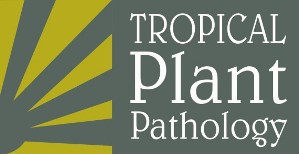Corynespora cassiicola is the causal agent of target spot on several crops of economic importance. Since the availability of standardized protocols for inoculum production makes the conduction of patogenicity tests easier, the objectives of this work were to evaluate the mycelial growth under different temperatures, to evaluate the mycelial growth and spore production under different photoperiods for isolates obtained from different hosts, to evaluate the effect of continuous humidity on spore germination, and the pathogenicity of seven isolates of C. cassiicola on several hosts. Temperatures between 23,3 and 29,5ºC allowed the best growth of the isolates. The growth of eight isolates did not respond to the photoperiods used whereas six isolates were sensitive to the dark. The best sporulation for the majority of isolates was under continuous light. Five to twenty hours of continuous humidity were enough for 85% of the spores to germinate. As for pathogenicity, cotton, melon and cucumber were the most susceptible hosts, while tomato, coffee and Antilles cherry were the least susceptible. For massal production of C. cassiicola inoculum, a temperature of 25ºC under continual light is recommended.
cross inoculation; daylength; pathogenicity; sporulation; spore germination; temperature





